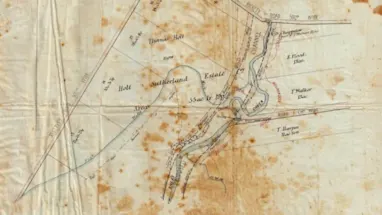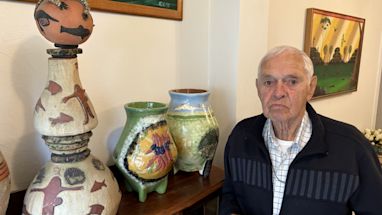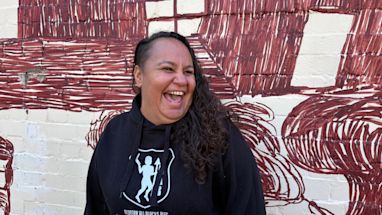Between 1910 and the 1970s, it’s estimated that 1 in 3 Aboriginal children were forcibly removed from their families, a practice sanctioned by race-based government policies.
The children – now known collectively as the Stolen Generations – were cut off from their Country, identity, language, community and culture. They were placed in institutional care or with non-Indigenous foster families and raised as ‘white’, a violation that systematically tore communities apart. The trauma caused by these violent acts remains to this day.
In regional NSW, one such place was Cootamundra Domestic Training Home.

Stolen children living in miserable conditions that failed to meet welfare standards
Cootamundra Domestic Training Home for Aboriginal Girls was established in 1912 in a disused hospital. The children were trained in domestic duties so they could be sent out to work as servants from as early as 14 or 15 years old – although their wages were almost always stolen or not paid at all. Parents were unable to regain access to their children until they turned 18, and in many cases, never saw them again.
The home was a harsh place, run with military control. The living and working conditions regularly failed to meet child welfare standards and the girls experienced physical, psychological, and sexual abuse until the home closed in 1969.
Complex trauma and lifelong consequences for survivors and their descendants
The Coota Girls Aboriginal Corporation was founded in 2013 by a group of the home’s Survivors who wanted to address the complex healing needs of the Stolen Generations.
Many Survivors were never able to go back home and reconnect with Country and culture. Children were told their parents were dead or didn’t want them, and generations of Aboriginal children were raised with the fear of removal. Subsequent generations have also been deprived of kinship and customs.
It's important to acknowledge the pain, suffering and loss that parents, families and the wider community suffered.
The team works to meet the social, emotional, and spiritual needs of Coota Girls Survivors, their families and other descendants in a survivor-led way. Reconnection to culture, collective healing events, trauma networks and other practical support like dealing with government agencies or services are just some examples.
Education and truth-telling sessions raise awareness in the community. The team also advocates for policy and other institutional change, preserves the former home and maintains a digital archive.

Remembering the Bringing them Home report
National Sorry Day is held on 26 May, observing the day the landmark Bringing them Home report , a national inquiry conducted by the Australian Human Rights Commission about the Stolen Generations.
It included oral and written testimony recorded not just from Survivors, but foster parents, former mission and government employees, church representatives and more, detailing the painful stories of Survivors from places like Cootamundra Domestic Training Home for Aboriginal Girls (1912-1969), and the ongoing, intergenerational impact of this trauma.
But it also recognises the resilience of Aboriginal and Torres Strait Islander peoples, reminding us that historical injustice is an ongoing source of intergenerational trauma. Critically, we must also acknowledge that many of the original report’s recommendations have not been applied, and so these injustices remain unresolved.
Honouring Stolen Generations Survivors on National Sorry Day
This year, the Coota Girls Aboriginal Corporation will host its yearly event on the Tarpeian Lawn in the Royal Botanic Garden, at the site of bara, a permanent artwork by Aboriginal artist Judy Watson.
The event will provide a space where Survivors can feel seen, cared for and understood by people who have experienced similar traumas. But there will also be an opportunity for truth-telling, with an educational walk along the Tarpeian Walkway displaying information about the home’s history.
Through the Aboriginal and Torres Strait Islander Collaboration Fund, the City of Sydney is proud to be able to help support the day. The funding program promotes local Aboriginal and Torres Strait Islander led projects in our local area.

Published 21 May 2024, updated 22 May 2024


